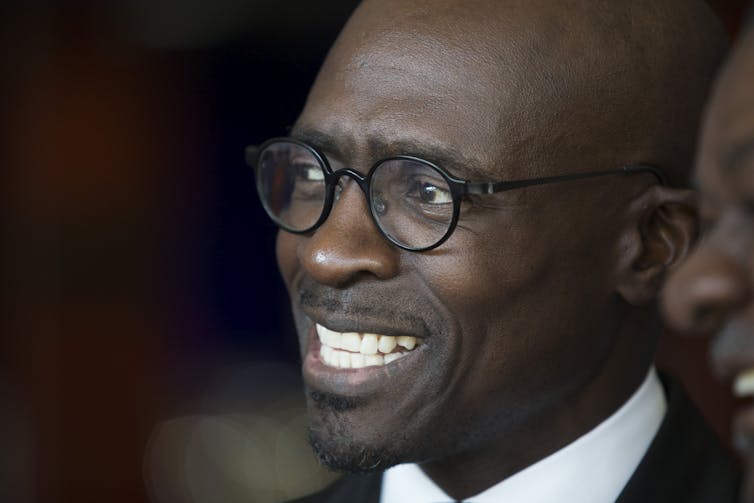
South Africa’s Finance Minister Malusi Gigaba has been forthright in recognising the crises facing the country.
EPA/Stringer
The first mid-term budget delivered by South Africa’s newish Finance Minister Malusi Gigaba was always likely to be judged largely on three issues: whether he was able to inspire confidence, what the government plans to do with the crises at the various state owned enterprises and whether he would pronounce definitively on its commitment to firming up a nuclear deal with Russia.
Whatever else Gigaba said was likely to be regarded as extra.
On balance, he did reasonably well on the confidence issue. He spoke clearly and with assurance, even with authority. To be sure, he delivered a lot of flannel. He reminded South Africans of the promises of the National Development Plan and the government’s commitment to Vision 2030; he spoke about the iniquities of the maldistribution of wealth and inequality and the government’s commitment to redistribution; he deplored “the challenges” (that overused word) faced by state owned enterprises, the high level of concentration in the private sector and the need to make the economy more globally competitive. And he inevitably he hailed the urgent need for “radical socio-economic transformation”. Words, words, words, one might say.
Against that, Gigaba’s speech was forthright in recognising the immediate crises facing the country. While stressing the importance of economic growth, he indicated that growth was expected to fall to 0.7% per annum, down from a previous somewhat less miserable estimate of 1.3%.
He recognised that the budget deficit was expected to increase from 4.3% from 3.1%. And he conceded that with lower economic activity government revenue was going to fall: indeed, the consolidated government deficit would climb to 60% of GDP by 2022.
Against these grim statistics, he stressed the need for greater tax morality, expenditure cuts, greater efficiency in government’s supply chain management and increased vigour in fighting corruption in state owned enterprises. And he even managed to say all this without smirking.
While it was important that he made it clear that the government recognises the mess the economy is in, he was extraordinarily light on detail about how it intended to clear it up.
The ratings agencies will doubtless be pleased that Gigaba announced no hike in corporation tax. For its part the African National Congress and its alliance partners would have been equally pleased that he announced no rise in Value Added Tax, which would hit the poor hardest. By the same token, he left it unclear – save by vague commitments to cutting costs – how the increasing gap between revenue and expenditure is to be tackled.
Raiding the piggy bank
The biggest news in Gigaba’s speech was his announcement that the government intends to sell a portion of its shares in Telkom to enable a recapitalisation of South African Airways and the South African Post Office. Many would say that he was left with little choice. While he thanked the banks for not pulling the plug on the airline by not demanding repayment of their loans, his raiding of Telkom’s piggy bank was an acknowledgement that no-one else was going to risk their money.
He also addressed the crisis in state owned enterprises by highlighting governance issues. This included the appointment of new boards for the airline as well as the state broadcaster and the need for them to recruit efficient managers and to tighten up governance and accountability.
Fine words, but equally, this was no announcement of the government drawing back from its notion of state owned enterprises as key drivers of the “developmental state”. Their current crises had obscured much that they had achieved, he said, such as the development of a pool of competent state managers.
Many would say that it’s a pity that their competence is not more evident.
If Gigaba said just enough to indicate that the government intends to do something to address the problems faced by state owned enterprises, the most glaring gap in his speech was any firm indication of how to tackle the cesspit of corruption that the state power utility Eskom has become.
Far worse than that were his weasel words about any prospective nuclear deal.
Speculation is rife that President Jacob Zuma is determined to sign off a deal to build nuclear power stations with the Russian nuclear agency, Rosatom, as quickly as possible – a deal which many reckon would bankrupt the country. Yet Gigaba chose not to calm the market’s nerves but to remain as vague as possible. Very deliberately, he chose to repeat a previous statement by Zuma that the signing of any nuclear deal would take estimates of the potential supply and demand for energy into full consideration, and would only proceed on the basis of “affordability”. Nobody is likely to believe that.
No sign of a change in direction
So, what’s to be made of this first substantive effort by Gigaba? The good news is that he didn’t try and obscure the grim financial situation that the government is facing.
But the bad news is that despite the waffle about the need for “radical socio-economic transformation”, there was nothing in his speech to indicate that the government is considering a significant change in direction.
Roger Southall, Professor of Sociology, University of the Witwatersrand
This article was originally published on The Conversation.
No comments:
Post a Comment